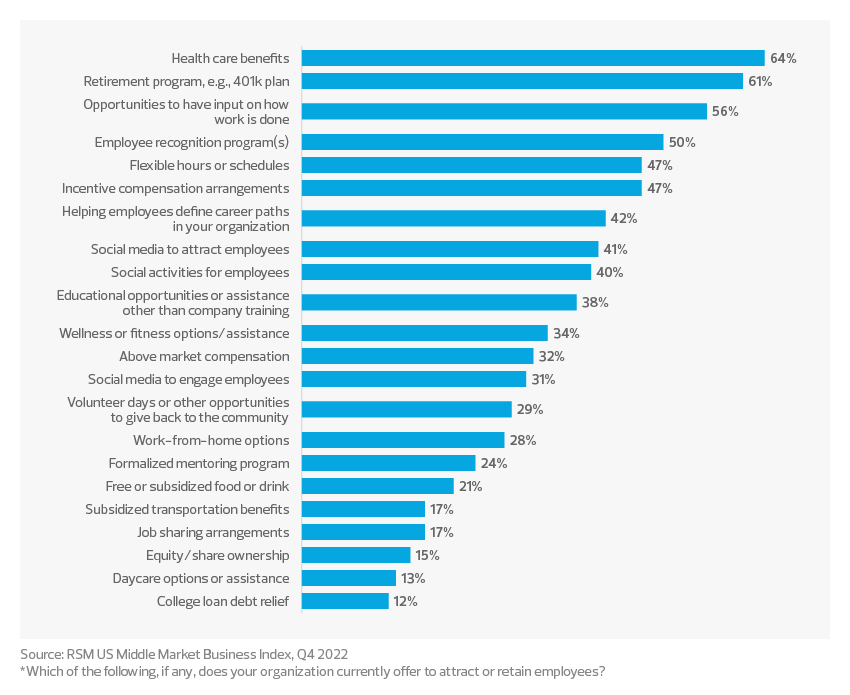Workforce Strategies Require ‘Balancing Act’ of Tax Implications
ARTICLE | January 25, 2023
Authored by RSM US LLP
Labor market pressures continue to compel businesses to strategize about the compensation and benefits used to attract and retain employees. From remote work arrangements and incentive compensation to education assistance to parking spaces for electric vehicles, the range of items in any total rewards package can seem limited only by the imagination.
Most compensation methods and benefits, whether traditional or relatively new to the equation, affect an employer’s or employee’s tax obligations in some way. Taking those implications into account helps businesses establish a sustainable approach to their workforce objectives. They’re also key to remaining competitive, especially since 83% of middle market executives anticipate some degree of challenges in staffing open positions in their organization through the first three quarters of 2023, according to the Q4 2022 RSM US Middle Market Business Index survey.
“Tax needs to be at the table in conversations about overall compensation philosophy—not necessarily as the decision-maker, but because businesses should weigh it as a factor in the cost of whatever they’re doing,” said Anne Bushman, a partner in RSM’s Washington National Tax group and leader of the firm’s compensation and benefits practice.
Take remote work, for example; 33% of middle market companies reported having employees working remotely due to the pandemic who were not doing so before the pandemic (a slight dip from 36% a year ago). Of that segment, 54% consider making remote work a full-time permanent option for some employees.
There’s a litany of tax considerations for those companies structuring remote work arrangements, including state and local income tax withholding requirements and compliance ramifications of the so-called tax home of remote and hybrid employees. The potential for unexpected tax obligations is higher for employers that don’t understand how laws apply, not to mention the costs of compliance in an increasing number of jurisdictions.
“You’ve got to do your homework and understand what your requirements are so you can make informed business decisions,” said Peter Berard, RSM senior director and leader of the firm’s employment tax practice.
“If an employee is getting value from the flexibility of a remote work arrangement, maybe the employer can dial down a salary level or a benefit from somewhere else—because it’s all a balancing act.”
Anne Bushman, partner in RSM’s Washington National Tax, on tax affecting compensation philosophy
Rather than tax driving those decisions, though, Berard and Bushman suggest a comprehensive compensation philosophy should shape workforce strategy.
Bushman encourages businesses to ask themselves what value they are providing employees. And as workers continue to make their preferences known—including flexibility in where and when they work and offerings that make them feel valued—a strategy to serve both parties can come into focus.
“If an employee is getting value from the flexibility of a remote work arrangement, maybe the employer can dial down a salary level or a benefit from somewhere else—because it’s all a balancing act,” she said.
The compensation methods and benefits on the scale vary too. Retirement programs (61%), incentive compensation arrangements (47%), education opportunities or assistance (38%), subsidized transportation benefits (17%) and equity/share ownership (15%) are among more than 20 compensation methods and benefits that middle market executives said their companies are offering to attract and retain employees, according to the MMBI survey.
That list evolves along with the labor market and other economic conditions, which is why companies benefit from regularly revisiting their compensation philosophy.
“We’re in another shift right now where we’ve been in an inflationary period and we’re talking about a recession,” Bushman said. “How might that change your plan? Do you have to dial back the cash compensation because you simply cannot afford it? You can get ahead of that when you know it’s coming.”
This article was written by Anne Bushman, Peter Berard and originally appeared on Jan 25, 2023.
2022 RSM US LLP. All rights reserved.
https://rsmus.com/insights/services/business-tax/workforce-strategies-require-balancing-act-of-tax-implications.html
The information contained herein is general in nature and based on authorities that are subject to change. RSM US LLP guarantees neither the accuracy nor completeness of any information and is not responsible for any errors or omissions, or for results obtained by others as a result of reliance upon such information. RSM US LLP assumes no obligation to inform the reader of any changes in tax laws or other factors that could affect information contained herein. This publication does not, and is not intended to, provide legal, tax or accounting advice, and readers should consult their tax advisors concerning the application of tax laws to their particular situations. This analysis is not tax advice and is not intended or written to be used, and cannot be used, for purposes of avoiding tax penalties that may be imposed on any taxpayer.
RSM US Alliance provides its members with access to resources of RSM US LLP. RSM US Alliance member firms are separate and independent businesses and legal entities that are responsible for their own acts and omissions, and each are separate and independent from RSM US LLP. RSM US LLP is the U.S. member firm of RSM International, a global network of independent audit, tax, and consulting firms. Members of RSM US Alliance have access to RSM International resources through RSM US LLP but are not member firms of RSM International. Visit rsmus.com/aboutus for more information regarding RSM US LLP and RSM International. The RSM(tm) brandmark is used under license by RSM US LLP. RSM US Alliance products and services are proprietary to RSM US LLP.

|
Chortek is a proud member of RSM US Alliance, a premier affiliation of independent accounting and consulting firms in the United States. RSM US Alliance provides our firm with access to resources of RSM US LLP, the leading provider of audit, tax and consulting services focused on the middle market. RSM US LLP is a licensed CPA firm and the U.S. member of RSM International, a global network of independent audit, tax and consulting firms with more than 43,000 people in over 120 countries. Our membership in RSM US Alliance has elevated our capabilities in the marketplace, helping to differentiate our firm from the competition while allowing us to maintain our independence and entrepreneurial culture. We have access to a valuable peer network of like-sized firms as well as a broad range of tools, expertise, and technical resources. For more information on how the Chortek can assist you, please call us at contact us. |





